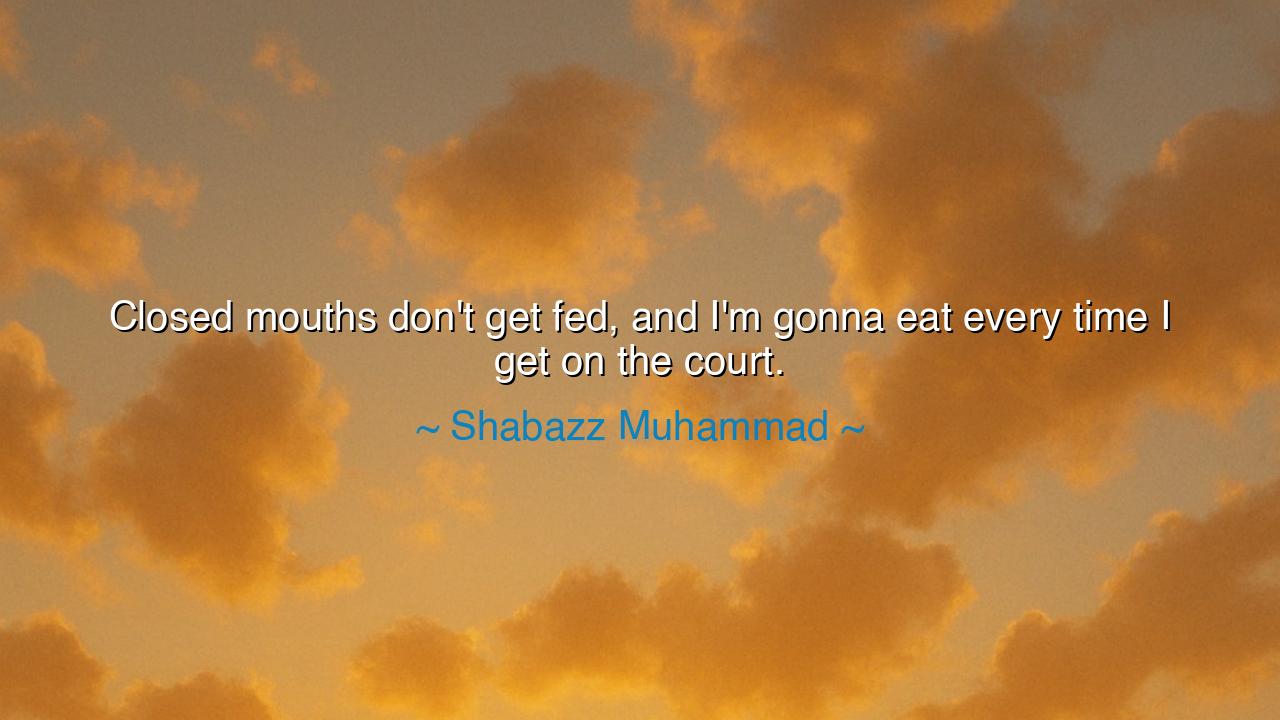
Closed mouths don't get fed, and I'm gonna eat every time I get






Shabazz Muhammad, warrior of the hardwood, declared with fire: “Closed mouths don’t get fed, and I’m gonna eat every time I get on the court.” Though spoken in the language of sport, within this saying lies a truth as ancient as survival itself: those who remain silent, those who wait without action, those who shrink from hunger, will be left empty. But those who demand their place, who strive with courage, who pursue their goals with relentless hunger, will find their portion. To eat is not merely to take food; it is to claim life, to seize opportunity, to refuse to leave the table of destiny unfed.
The meaning of this quote begins in necessity. A closed mouth symbolizes passivity—the one who does not ask, who does not fight, who does not speak, will remain unseen and unheard. Life does not always grant freely; it rewards those who step forward, those who reach, those who hunger enough to act. On the court, this is translated into effort, determination, and seizing every chance to score, to prove, to excel. Beyond the game, it is the same in all walks of life: to remain silent is to surrender; to act with hunger is to live fully.
History provides countless mirrors of this wisdom. Consider the tale of Frederick Douglass, who was born into bondage. He might have accepted silence, but he refused. He hungered for freedom, for dignity, for a voice. By teaching himself to read, by daring to escape, by speaking out against the chains of slavery, he proved the power of an open mouth and a fearless heart. Had he remained silent, his life would have been swallowed by darkness. But because he spoke and acted, generations were nourished by his courage.
Or recall the story of Alexander the Great, who, standing before the vast Persian Empire, might have chosen caution. Instead, he hungered for glory and seized every battle as though it were his to claim. He did not wait for fortune to feed him; he ate by conquest, by daring, by refusing to leave opportunity untaken. His hunger became his legend, and though history may weigh his ambition, it cannot deny the truth that he never left the field unfed.
The lesson is that life favors the bold. If you do not ask, you do not receive. If you do not strive, you do not win. The timid heart that waits for gifts may go hungry, while the one who hungers with courage will find nourishment in effort, even in defeat. To eat every time you step on the court means to give everything, to treat every chance as sacred, to take nothing for granted. It means living with urgency, with intensity, with the fire of one who knows that tomorrow is not promised.
In practice, this teaching calls us to abandon passivity. Speak when truth must be spoken. Work when others sleep. Reach for the opportunity before it vanishes. Do not wait to be invited to greatness—step forward and claim it. Hunger for improvement, hunger for justice, hunger for life itself. Every time you are given the chance—on the court, in your work, in your relationships—eat: give your all, demand your place, and let your hunger drive you toward fulfillment.
Therefore, children of tomorrow, remember the voice of Shabazz Muhammad: closed mouths don’t get fed. Do not let fear seal your lips or hesitation bind your hands. Hunger with purpose. Strive with courage. Seize with fire. For the table of life is wide, but only those who ask, who act, who hunger, will rise from it nourished. Go forth, then, and every time you step into the arena of your destiny, eat with all your might—until your strength and courage themselves become a feast for those who follow after you.






AAdministratorAdministrator
Welcome, honored guests. Please leave a comment, we will respond soon